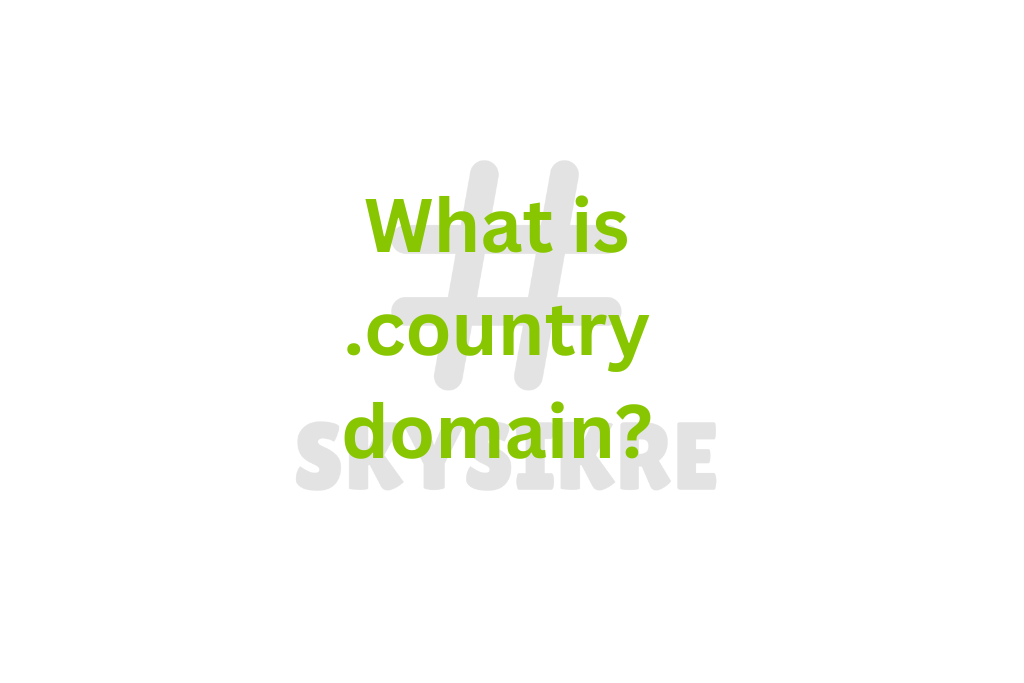What is a .country Domain?
The .country domain is a top-level domain (TLD) specifically designed to represent a country or a nation in the online space. Introduced as a part of the expansion of domain name options, the .country TLD provides an opportunity for businesses, organizations, and individuals to underline their national identity or regional affiliation in their digital presence. This domain extension serves as an informative and recognizable indicator of where a brand or entity is based, allowing for a connection between online content and geographical identity.
The primary purpose of the .country domain is to enhance branding efforts by highlighting a particular country, making it an excellent choice for local businesses that want to attract a specific audience related to their location. Moreover, this extension can be beneficial for government agencies, tourism boards, cultural organizations, and other entities that aim to promote national interests or regional initiatives. For instance, a culinary tourism website could use a .country domain to emphasize its focus on the gastronomy specific to that region, whereas a cultural festival could operate under a .country extension to draw attention to local traditions and heritage.
Furthermore, the .country domain can aid in establishing a sense of trust and loyalty among local consumers who may prefer engaging with businesses that resonate with their national identity. It can also be a practical option for individuals who wish to showcase their ties to their homeland in various online platforms. In essence, the .country domain serves not only as a digital address but also as a reflection of cultural pride and an assertion of local presence in an increasingly globalized online marketplace.
The Importance of Domain Choice
The selection of an appropriate domain extension is a critical decision for businesses and organizations aiming to establish an online presence. Among the various options available, the .country domain offers unique advantages, particularly for those targeting specific geographic regions. This domain extension can significantly enhance a website’s relevance to local audiences, boosting its recognition and appeal in the digital landscape.
One of the primary benefits of a .country domain is its ability to convey geographical context. Utilizing this extension allows brands to clearly communicate their focus on a particular nation or area, enabling them to connect with local consumers more effectively. This connection is not merely symbolic; it can also influence user behavior, as visitors often prefer to engage with websites that reflect their cultural or national identity. Therefore, the .country domain can play a pivotal role in fostering a sense of familiarity and trust among users.
Moreover, having a country-specific domain can significantly impact a website’s search engine optimization (SEO) strategy. Search engines often prioritize local content in their results, which means that a website using a .country domain may achieve higher rankings for searches conducted within that geographical area. This advantage becomes even more pronounced when paired with localized content, ensuring businesses can reach their target audience efficiently.
Furthermore, a .country domain can help organizations establish credibility. When users see a domain that correlates with their location, they are more likely to perceive the website as legitimate and trustworthy. This trust is crucial in today’s digital marketplace, where consumers are increasingly discerning about the sites they engage with. Thus, choosing a .country domain not only enhances branding but can lead to improved user engagement and ultimately drive better business outcomes.
Legal and Regulatory Aspects of .country Domains
The registration and use of .country domains are governed by a specific legal and regulatory framework, which varies depending on the country in question. These domains are considered country-code top-level domains (ccTLDs) and are primarily intended for entities tied to a specific nation. Thus, understanding the legal parameters surrounding country domains is crucial for individuals and organizations seeking to establish an online presence.
Firstly, the registration process for a .country domain typically involves demonstrating eligibility, which may include proving residency, a local presence, or a business operation in that country. Domain registrars often impose certain restrictions to ensure that only eligible individuals or organizations can register these domains. For instance, some countries require registrants to provide valid identification or legal documents that confirm their connection to the nation. Understanding these prerequisites is vital to avoid complications during the registration procedure.
In terms of ownership rights, holders of .country domains generally enjoy rights similar to those associated with other domain extensions. However, specific regulations might dictate how these domains can be used, including adherence to local laws regarding content and intellectual property. Additionally, some countries have laws that protect local cultural or geographical names from misuse in domain registrations, which can limit the availability of certain names.
Moreover, organizations or individuals using .country domains must adhere to obligations such as maintaining accurate registration information and responding to any disputes or challenges regarding their domain rights. Failure to comply with these regulations may result in sanctions or even the forfeiture of the domain. Therefore, it is essential to be aware of both the rights and responsibilities that accompany .country domain registration.
Benefits of Using a .country Domain
The .country domain extension presents a myriad of advantages, particularly for businesses or organizations aiming to establish a strong national identity. This unique top-level domain (TLD) signifies a clear geographical association, making it intuitive for both local and international audiences to recognize the operational base of a website. By utilizing a .country domain, organizations reinforce their branding with a straightforward community-centric approach, which can effectively enhance visibility, rapport, and trust among local consumers.
Furthermore, adopting a .country domain fosters a sense of belonging and community among users. As digital platforms become increasingly localized, consumers prefer connecting with businesses that reflect their cultural and national identity. A .country domain serves as an affirmation of this connection, signaling to consumers that the entity caters to their specific region. This bolsters customer loyalty, as users tend to choose services and products from businesses that resonate with their local values and customs.
In addition to establishing a national identity, a .country domain contributes significantly to targeted marketing strategies. Brands can tailor their content to meet the preferences and interests of their local audience, ensuring impactful communication that directly addresses the needs of the community. This specificity not only enhances the effectiveness of marketing campaigns but also aids in improving return on investment (ROI) through increased engagement and conversion rates.
Moreover, a .country domain enhances the overall credibility of a website. Users are often more inclined to trust websites that exhibit a national identity, particularly when making purchases or sharing personal information. A reputable .country domain conveys professionalism and commitment to local standards, ultimately supporting businesses in standing out in competitive markets.
Challenges and Limitations of .country Domains
The .country domain, while providing a specific geographical context, does come with its share of challenges and limitations that users must be cognizant of. One major concern is related to Search Engine Optimization (SEO). Traditional .com or .org domains often enjoy greater recognition and authority among search engines. Consequently, websites utilizing a .country domain may initially receive lower rankings in searches, especially if they are competing against more established domains. This can lead to reduced visibility and, ultimately, fewer visitors, especially in a global context where a broader audience may not immediately recognize country-specific domains.
Furthermore, perceptions play a crucial role in how .country domains are viewed by international audiences. Users may question the credibility of websites carrying a .country domain, primarily if they are not familiar with the specific country’s domain registration policies. For instance, an American user might find a .country domain associated with a less familiar country less trustworthy than a traditional domain. This perception issue can hinder the establishment of a reputable online presence for businesses and individuals operating in the global marketplace.
In addition to these SEO and perception challenges, there are administrative hurdles associated with registering and managing a .country domain. Each country typically has its governance bodies, which can impose unique registration requirements, rules, and regulations. These varying conditions can complicate domain acquisition and necessitate a thorough understanding of the specific regulations that apply to the desired country domain. Consequently, potential registrants must invest time and resources to navigate these administrative landscapes effectively.
How to Register a .country Domain
Registering a .country domain name can be a straightforward process if you follow some essential steps. The first step is to select a reliable registrant accredited by the Internet Corporation for Assigned Names and Numbers (ICANN). A reputable registrant will provide you with the tools and support necessary to secure your desired domain name efficiently.
Once you have identified a suitable registrant, the next step is to research the availability of your intended domain name. It is important to brainstorm different variations and combinations that reflect your brand or personal identity since many desirable names may already be taken. Most registrars offer a search feature on their websites that will help determine if the .country domain you want is available or if alternatives should be considered.
After ensuring that your desired .country domain name is available, you can begin the registration process. This typically entails creating an account with your chosen registrant and entering the domain name you want to register. During this step, you will be required to provide personal information, including your contact details and, in some cases, business identification if the registration is for commercial purposes. Ensure that all information is accurate as it will be used to maintain the ownership records of your domain.
Additionally, it is crucial to review the terms and conditions of the registration agreement. Understanding these details will help you avoid potential issues in the future. Once you have completed the registration process, consider implementing best practices for securing a strong domain name. This can include enabling privacy protection to keep your personal information confidential and setting up automatic renewals to prevent accidental lapses in ownership.
By following these steps, you can effectively navigate the registration process for a .country domain and establish a solid online presence that reflects your brand or personal website aspirations.
Case Studies: Successful Usage of .country Domains
The .country domain has proven to be an effective branding and marketing tool for various organizations, enhancing their visibility and engagement with target audiences. One notable case study involves a tourism board from a European nation that decided to rebrand its online presence using a .country domain. This strategic move allowed the organization to create a more specific and localized online identity. By utilizing the .country domain, the board was able to better connect with international travelers searching for authentic experiences within the country. The transition resulted in a 40% increase in web traffic and a significant boost in engagement on social media platforms.
Another example can be found in the sports sector, where a regional football club adopted a .country domain to establish a distinctive digital identity. By integrating the .country domain into its marketing strategies, the club attracted attention not only from local fans but also from the international sports community. Through targeted campaigns showcasing the unique culture and sporting heritage of the country, the club saw a substantial increase in memberships and ticket sales, demonstrating the efficacy of a .country domain in amplifying its reach.
Additionally, a non-profit organization focusing on environmental conservation successfully implemented a .country domain to raise awareness about its initiatives. The organization utilized the domain to create a dedicated platform for fundraising and community engagement, sharing local stories and spotlighting projects that resonated with both local residents and international supporters. As a result, the platform saw a remarkable increase in donations and volunteer sign-ups, showcasing how a .country domain can foster a sense of community and ownership.
These case studies illustrate the versatile applications of the .country domain across various sectors. Each instance highlights how these domains can not only enhance branding efforts but also engage a target audience more effectively, providing a compelling narrative that resonates on a personal level.
Future of .country Domains in the Digital Landscape
The digital landscape is continuously evolving, and the emergence of the .country domain represents an essential development in how individuals and organizations establish their online presence. As the internet becomes more intertwined with daily life, the demand for localized content is expected to escalate. This trend is likely to impact the adoption of country-specific domains, such as .country, as businesses and individuals strive to connect more meaningfully with their local audiences.
One significant factor influencing the future of .country domains is the increasing emphasis on localization. As internet usage expands globally, the need for content that resonates with specific cultures and regions becomes paramount. Organizations are recognizing that leveraging a .country domain can enhance their credibility and relevance within a specific geographic area. This trend may lead to a rise in domain registrations, as more entities seek to create websites that reflect local nuances and cater to regional consumers.
Furthermore, as global internet usage patterns shift, with growing numbers of users accessing the web from mobile devices, there may be a greater preference for succinct and easily identifiable domain names. The introduction of .country domains could fulfill this requirement by providing a straightforward and recognizable identifier tied to a geographical location. Such domains can serve as a powerful tool for branding, allowing companies to signal their origin and establish trust with local users, which may significantly influence future marketing strategies.
In conclusion, the future of .country domains appears promising as digital strategies increasingly prioritize localization. As global internet dynamics continue to unfold, .country domains may play a vital role in shaping how businesses and organizations engage with their audiences, forging a deeper connection through localized online identities.






